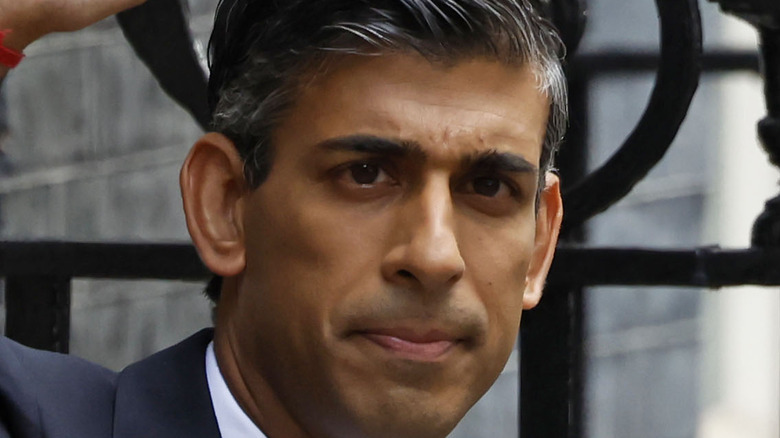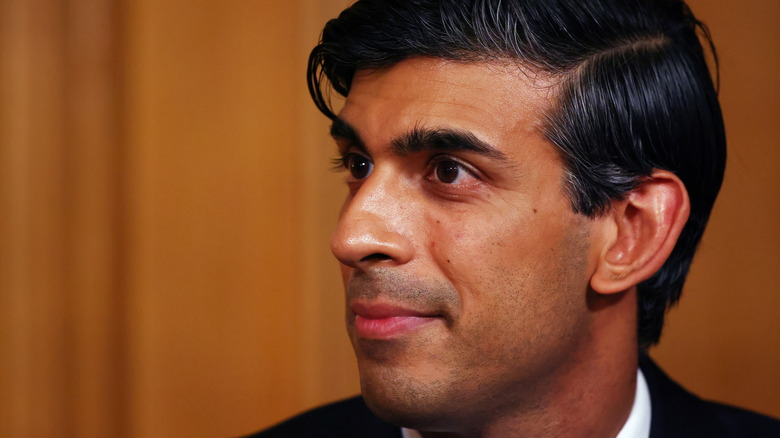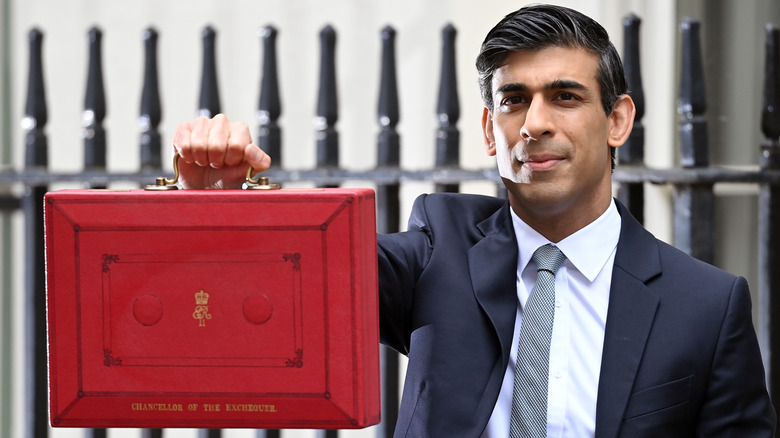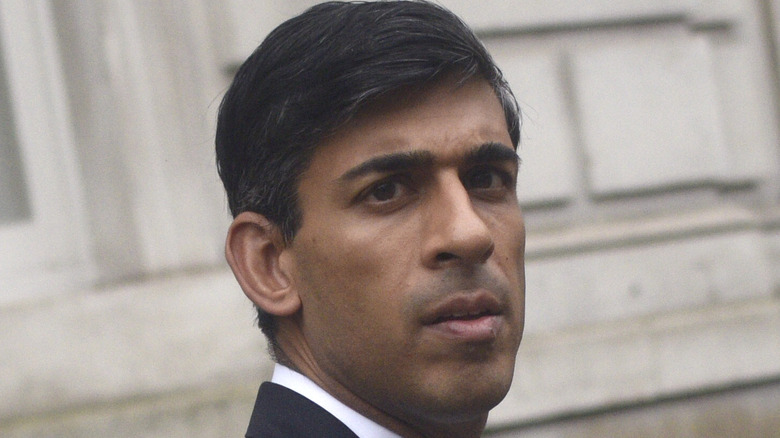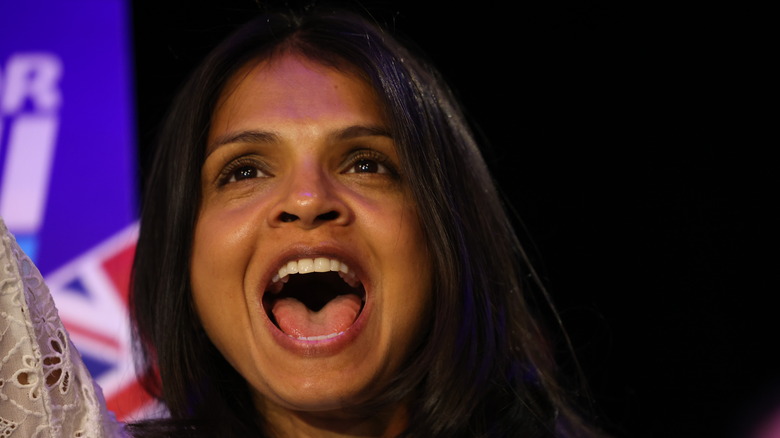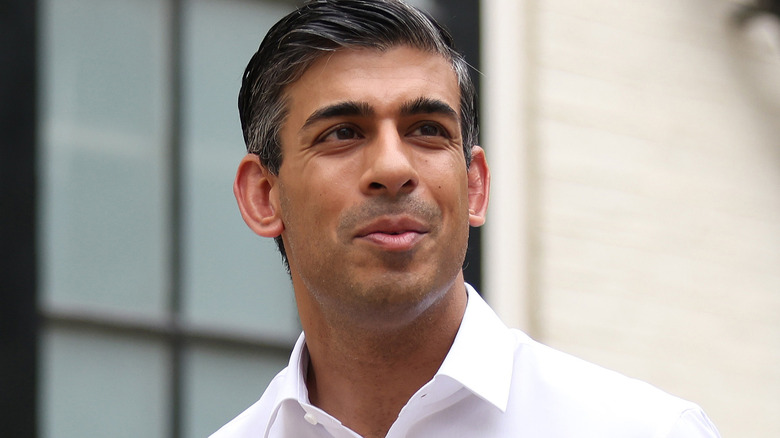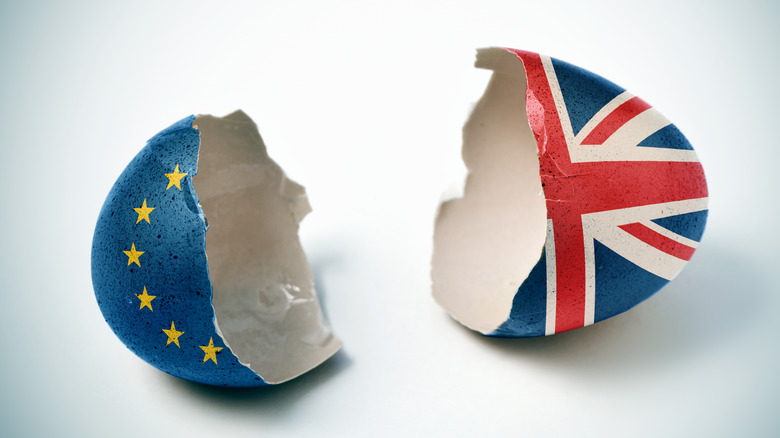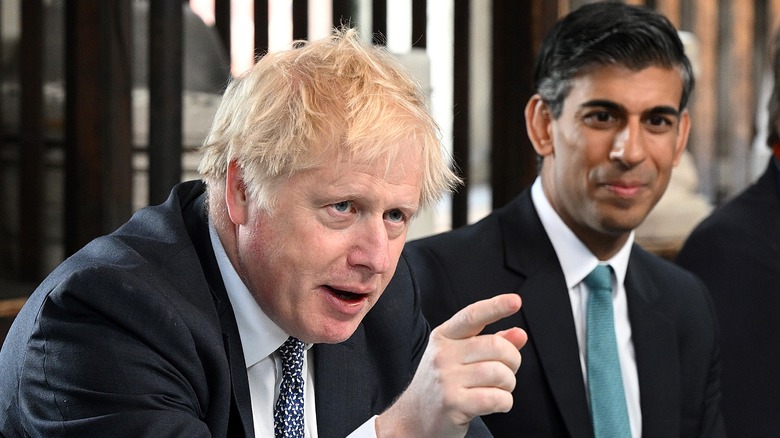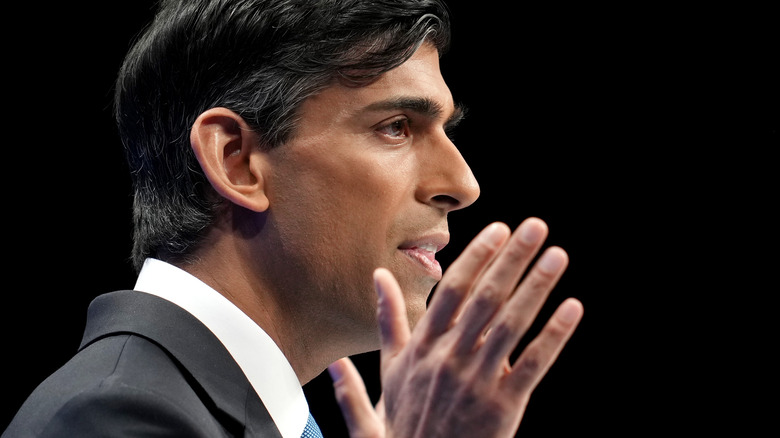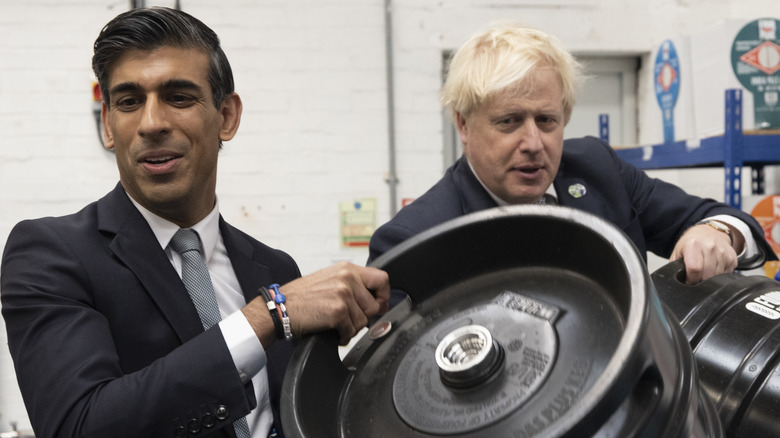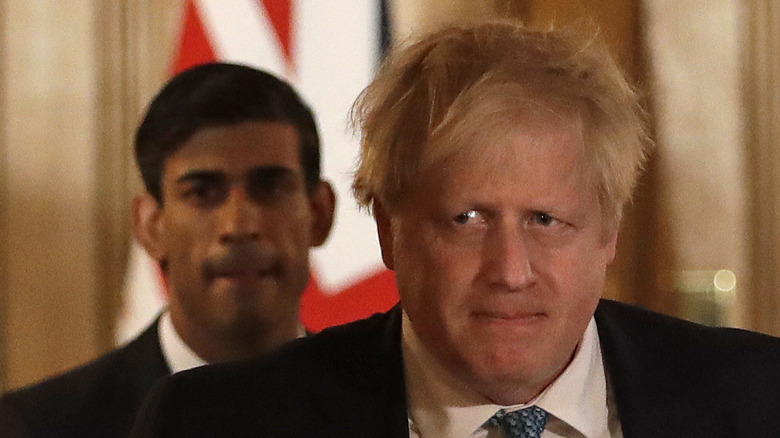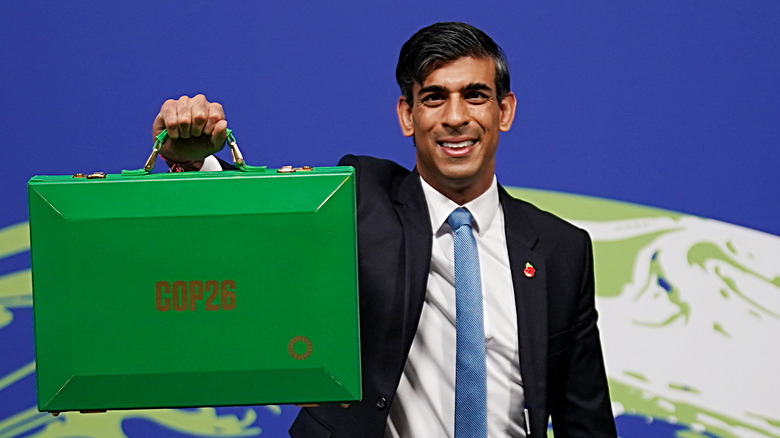Who Is Rishi Sunak? Your Guide To The British Politician
If any Briton woke up on January 1, 2022, thinking that it might prove to be an uneventful year, they've long since been disabused of the idea. Queen Elizabeth II passed away, the Russo-Ukrainian War put Britain back in the headlines as a player on the world stage (via France24), and the country has seen three prime ministers without a general election.
Boris Johnson resigned in disgrace during the summer, as per The New York Times. In the race to replace him, two candidates took the lead: Liz Truss, the foreign secretary, and Rishi Sunak, the former chancellor. While Truss retained a comfortable lead in polls among Conservative party members and ultimately won, the contest was tighter than many were predicting. According to the Business Standard, Sunak's decision earlier in the year to resign may have hurt him with Tory voters with a lingering commitment to Johnson.
Forty four days later — the shortest-ever tenure for a prime minister, per The Washington Post — it was Truss' turn to resign, her support among Britons and within the Tory party having collapsed following her economic proposals. Taking her place was Sunak, who was elevated to the position without a general election or even a vote among Conservative MPs, reports The Guardian. Despite calls for an early general election, Sunak has so far refused to consider such a course. Instead, he has told the ruling Conservatives to unite around him and asked voters for time to bring stability to Britain.
From India to Britain by way of Africa
Rishi Sunak was born on May 12, 1980, in Southampton, Hampshire, as per Britannica. His parents, Usha and Yashveer Sunak, married in Leicester three years before, according to The Print, but their parents were born, raised, and married half the world away. Both sets of Rishi Sunak's grandparents were Punjabi Hindus who immigrated to British-controlled Africa. His paternal grandfather, Ramdas Sunak, was born in Gujranwala, now a part of Pakistan, and took his family out to pursue work opportunities and escape growing tensions between Hindu and Muslim communities. He became a clerk in Nairobi and later a colonial administrator in Kenya.
Rishi's maternal grandfather, Raghubir Berry, grew up in what is now the modern state of Punjab in India. He also came to Africa for work. He was an engineer for the railroad in Tanzania before relocating to the United Kingdom and taking a job in the Inland Revenue department. In 1988, he was made a member of the Order of the British Empire.
Ramdas Sunak's son, Yashveer Sunak, one of six children, was born in Nairobi but moved to the U.K. to study medicine at the University of Liverpool in 1966. Raghubir Berry's daughter, Usha Berry, one of three daughters, studied pharmacology at Aston University. After marriage, Yashveer and Usha settled in Southampton, where Yashveer maintained a family practice, and Usha maintained a pharmacy (per the BBC). Rishi Sunak has always been outspoken about his parents' dedication and sacrifice for the sake of his upbringing and education.
He's the first person of color to be prime minister
Rishi Sunak has a number of distinguishing characteristics as a prime minister. At 42, he's the youngest man to hold the job in over 200 years, according to First Post (the record holder, William Pitt the Younger, became prime minister at 24). He's also the first person of color to lead the U.K.'s government (per Semafor), a fact that has not escaped his notice, nor that of the world press.
Sunak told the BBC that he didn't face much overt prejudice while growing up in Britain, to his good fortune. But Avinash Paliwal has argued that racial attitudes are deeply embedded in British society (via The Washington Post), and Sunak himself recounted an experience from his adolescence where he and his brother and sister were called ethnic slurs at a restaurant. But he doubts that experience would be common in the Britain of today, and except for an isolated radio call-in, Sunak's ethnicity was a non-issue in his campaign for the premiership.
Sunak is also a practicing Hindu, something he's always been happy to declare. As First Post reports, he's taken his oaths of office on the Bhagavad Gita and maintained worship at his chosen temple even during the heights of campaign season. His recent accession to prime minister coincided, reported Semafor, with the Hindu festival of Diwali, and the Indian diaspora in Britain and around the world have celebrated his appointment to prime minister on account of his cultural and religious background.
Before politics, Rishi Sunak worked in finance
Per Sky News, Rishi Sunak attended Winchester College, the oldest public school in England, and went on to study philosophy, politics, and economics at Oxford University. That degree has a reputation for growing future politicians in Britain, according to The Guardian, but Sunak seemed more focused on the economics side. He was president of the school's investment society and, according to Sky News, reportedly had job offers coming his way as early as his second year at Oxford, all of them from the financial sector. Perhaps it's appropriate then that, after finishing his degree, he finally accepted a position as an analyst at Goldman Sachs.
Sunak worked for the bank between 2001 and 2004, and according to the Financial Times, his colleagues and supervisors remember his work fondly and were sad to see him leave. As the Guardian notes, he left the bank to persue an MBA at Stanford. After completing his master's, Sunak went to work for a hedge fund, the Children's Investment Fund Management (TCI), a somewhat notorious group that's attempted to coerce companies to fit their position. Sunak was involved in a contentious battle between TCI and United States freight group CSX.
After the 2008 financial crisis, Sunak followed TCI co-founder Patrick Degorce to a new fund, Thélème Partners, in America. The association with Degorce would come back to haunt Sunak in his political career, as Degorce was accused of a multi-million dollar tax avoidance scheme during their time together (per The Guardian).
His wife was richer than the queen
While completing his master's degree at Stanford University, Rishi Sunak met Akshata Murthy, the daughter of Indian billionaire and multinational information technology company Infosys co-founder Narayana Murthy (per the BBC). The two married in Bangalore in 2009, in what the Telegraph of India reported was a high-profile wedding attended by many prominent names in Indian society.
After Sunak became chancellor in 2020, his family's financial situation came under scrutiny. The Guardian reported that year that Akshata Murthy's shares in her father's company were valued at £430 million, which alone made her richer than Queen Elizabeth II. Directly or through her family, she had considerable shares in numerous other business ventures with high value marks. Sunak made no mention of his wife's holdings in Infosys, or her family's vast wealth and investments, in his declaration of financial interests under the ministerial code. Two years later, as Sunak pursued higher taxes, The Guardian reported that Akshata may have avoided up to £20 million in U.K. tax by declaring her permanent home outside the country.
Besides any suggestion of impropriety by his wife on taxes or his declarations to the government, the considerable riches of Sunak's family have raised questions with voters. The BBC has argued that his wealth could put him at too great a distance with ordinary Britons, and some of his critics have echoed that concern.
He won a decisive majority in his first election
After several years working in the financial sector in Britain and America, Rishi Sunak turned to politics. In 2014, he stood for Parliament in Richmond, Yorkshire, the biggest county in England, according to the Telegraph of India. It's among the most solidly Conservative areas of the U.K. — former Tory leader William Hague held the seat for decades, and it was to replace Hague as the Tory candidate that Sunak first entered the race. Ninety potential candidates put their hat into that ring, and the conservative nature of the seat would seem at first glance to rule out Sunak altogether. While born and raised in Britain, his ancestry was Indian, and he was unusually young.
But Sunak beat the odds. He made it to the final shortlist of four candidates, held his own in a question-and-answer session with local Tory voters, and won the candidacy with over 50% of the vote. Hague voiced his approval of Sunak as his successor and committed to campaigning for him during the 2015 general election. In that contest, Sunak won a comparable share of Richmond's vote. According to U.K. Parliament, he came away with 51.4% of the vote, with Matthew Cooke of UKIP coming in second with 15.2%.
He was a Leaver in the Brexit debate
Rishi Sunak first came to Parliament as the member of Parliament (MP) of Richmond, Yorkshire, in 2015 (per U.K. Parliament). Almost immediately, he had to deal with one of the most significant political issues of the 21st century in Britain: Brexit. The campaign ahead of the referendum on whether to remain in the European Union or not was revving up, and there were considerable tensions within the Conservative party between remain and leave voters.
Sunak gave his views on the subject to the Yorkshire Post in February 2016. Despite his extensive business experience all over the world, Sunak declared himself in favor of leaving the EU. He said that his business career was why he opposed remaining part of the bloc; its bureaucracy was a frustration to growth, he claimed, and an impediment to small businesses and native produce. Citing the examples of Canada, South Korea, and South Africa, he said that a U.K. outside the EU could trade with Europe, enjoy greater independence, and escape stagnation.
In taking leave's side, Sunak put himself not only against then-prime minister David Cameron but Sunak's predecessor as MP of Richmond, William Hague. Sunak referred to the decision as the most difficult of his political career but deferred ultimate responsibility to the voters in the July 2016 referendum.
Rishi Sunak campaigned hard for Boris Johnson
The United Kingdom's current state of political turbulence has been brewing for some time. The year 2019 saw the resignation of Prime Minister Theresa May after she failed to win parliamentary support for her negotiated deal with the European Union on Britain's withdrawal from the bloc (per the BBC). Her stepping down triggered a contest for leadership of the Conservative party, with the winner taking the premiership and the responsibility of carrying through Brexit.
In the race for prime minister, Rishi Sunak had a clear preference. In June 2019 he, Robert Jenrick, and Oliver Dowden took to the pages of The Times with an op-ed endorsing Boris Johnson. Framing the contest as choosing a bulwark against Nigel Farage's Brexit party on the one hand and Jeremy Corbyn's leadership of Labour on the other, they named Johnson as the only man capable of negotiating a deal for withdrawal with the EU and breaking through the logjam in Parliament to get any such deal approved.
Johnson won the leadership contest and became prime minister on July 24. Sunak's support of him during the contest did not go unappreciated. When the U.K. government issued a press release naming Johnson's various appointments, Sunak made the list as chief secretary to the treasury, the second-highest position in the HM Treasury.
He served as chancellor of the Exchequer
Rishi Sunak's political career received a significant boost in 2020. Sajid Javid, a mentor Sunak once described as his "Jedi master" (per the BBC), resigned as chancellor the Exchequer, the chief financial minister of the British government. Prime Minister Boris Johnson appointed Sunak, who was already acting as chief secretary to the treasury, in his place.
Becoming chancellor during the COVID-19 pandemic, Sunak was faced with millions of Britons put out of work due to lockdown. The Coronavirus Jobs Retention Scheme, commonly referred to as furlough in the press, according to the BBC, let workers put on leave earn 80% of their usual pay, up to £2500 a month, and provided a lifeline for 9.6 million workers. But Sunak pushed to retire furlough after only a few months and replace it with a new support scheme, saying that no chancellor could preserve every job and that it made no sense to keep people in unsustainable positions.
Sunak's favored Jobs Support Scheme was met with significant criticism by businesses, and he was pressured to make significant expansions to it ahead of winter 2020, reports The Guardian. By January 2022, he faced renewed scrutiny over his handling of the pandemic. Sky News reported that a lack of oversight of support schemes allowed for significant fraud, possibly up to £4.3 billion worth. Sunak insisted he didn't take such fraud lightly but appeared to be at odds with Johnson during Prime Minister Qquestions over the issue.
He was a party to Partygate
Boris Johnson's tenure as prime minister was littered with scandals. Per Reuters, he faced political, public, and press outrage over a refurbishment of No. 10 Downing Street, inappropriate lobbying, and accusations of sexual misconduct against numerous Conservative politicians. It was one such scandal, involving Johnson's false information regarding chief deputy whip, Christoper Pincher, that proved the final straw. But before Pincher, there was Partygate, and Rishi Sunak found himself stuck in that scandal.
"Partygate" is a catch-all term for a series of parties held by government members during the COVID-19 lockdown. One such party took place around the same time as Prince Philip's funeral, where Queen Elizabeth II was forced to sit alone in accordance with pandemic restrictions. Johnson and Sunak were found to have violated the law in attending one of these parties. Per CNBC, they were both fined and faced calls from the opposition to resign. Neither man did, but they did each issue an apology. Their critics were not satisfied by the gesture, and the scandal helped renew questions around Sunak's time in America and his wife's tax status.
It remains to be seen whether Partygate will come back to haunt Sunak as prime minister the same way it haunted his predecessor. One person who thinks it might is apparently Johnson himself. The Telegraph reported that Johnson and supporters discussed how an inquiry into Partygate might be used to undermine Sunak and call for a general election.
His resignation helped topple Boris Johnson
Boris Johnson weathered several political scandals and downswings in popularity between 2019 and 2022, but his luck finally ran out with the Pincher affair. Per Reuters, a former civil servant claimed that Johnson appointed Charles Pincher to chief deputy whip despite knowing of credible accusations of sexual harassment against him and provided false information about his knowledge. The charge against Johnson sparked a mass exodus of ministers from government, and among those to abandon ship was chancellor of the Exchequer Rishi Sunak.
In his public resignation letter (via The Guardian), Sunak stressed his loyalty to Johnson, including supporting him publicly on government matters the two disputed in private. He also avoided any direct mention of the Pincher affair. Instead, he framed his resignation as stemming from a parting of ways on how to deliver a shared vision of the economy, made clear by preparations for an upcoming joint speech on the subject.
The chancellor of the Exchequer is the most prominent financial office in the U.K. government, and Sunak's resignation marked a considerable escalation of Johnson's political jeopardy. This did not go unnoticed by those who remained loyal to the prime minister. When Johnson was forced to resign in July 2022 and Sunak stood for Conservative party leader, a former Downing Street official accused him of treachery in a statement to the Financial Times. Sunak's part in Johnson's downfall was used against him in the first leadership contest of 2022.
What is his environmental policy?
Americans may be used to their conservative party questioning the reality of climate change, but the Conservatives of the United Kingdom have accepted the facts and have shown a willingness to engage on the issue, if not always to the degree desired or needed. It was part of Liz Truss' downfall that her proposals so badly soured relationships between the government and environmental groups and betrayed long standing Tory policy on climate change (per The Guardian). Rishi Sunak's accession to the premiership was taken as a welcome relief.
Sunak has pledged a commitment to the Tory 2019 manifesto's proposals for the environment and climate change, described by Green Alliance director Shaun Spiers as impressive on such matters. Eco-minded Tory MPs were enthusiastic about his appointment. Sunak has publicly spoken about his daughters' concerns for the environment and acknowledged expert advice.
But Sunak has never bucked his party over environmental concerns, and his voting record shows a much less glowing environmental record than some of his words suggest. Per Euro News, Sunak opposed a windfall tax on oil and gas companies, a decarbonization target, and a drive to eliminate transport emissions, among other proposed initiatives. On the other hand, he did provide a VAT reduction for eco-friendly installations in private homes as chancellor and supported the creation of new parks.
